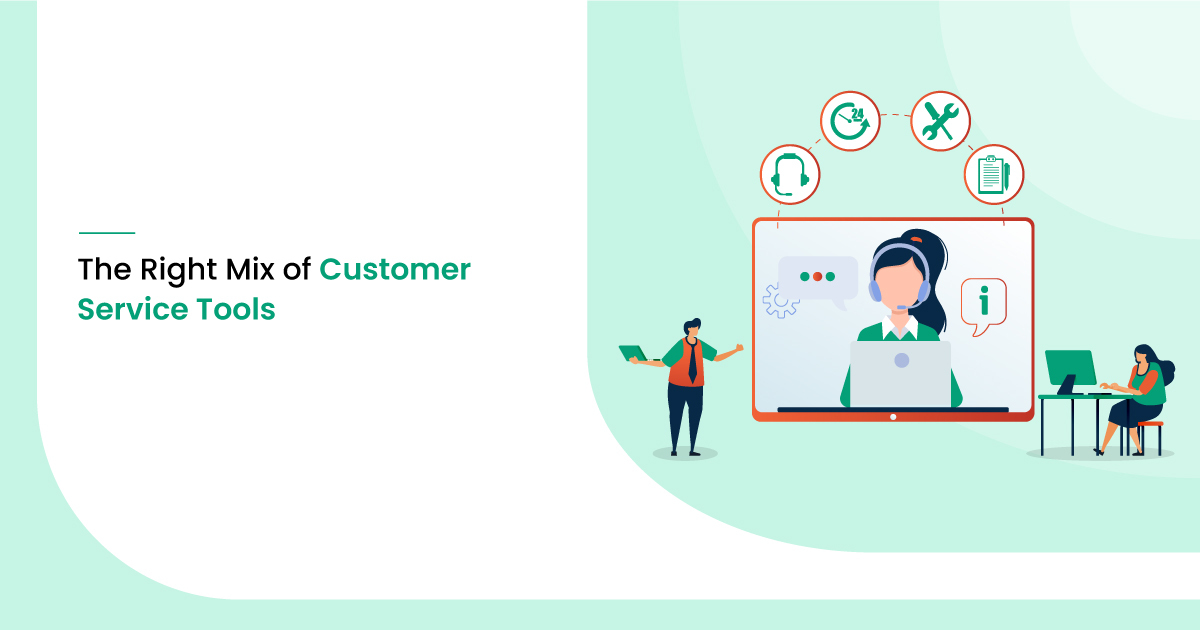No one expects you to be proficient in all the critical customer service skills on your first day of a customer-facing job. This article will help you to develop nine essential customer skills for every employee in your team. By following these steps systematically, your team would be ready to face any challenges.
Customers come in with different attitudes and moods, and it is not easy to handle an angry customer. Excellent customer service can be the panacea for your business. With an efficient customer support team, you can win over most customers, including the most dissatisfied ones.
Consider the following statistics:
- According to a Microsoft report on Global State of Customer Service, 90% of Americans used customer service quality as the defining criteria in doing business with a company.
- The same survey pointed out that 58% of Americans would switch their service provider because of poor services.
- A Salesforce research suggested that close to 90% of customers returned after a “positive customer service experience.”
So, excellent customer service not only helps you retain customers but also helps you win more of them!
By nurturing a few core competencies, you can teach your team the essential customer servicing skills. If you follow the steps given, we can assure you that your team would be better prepared.
With every employee giving their one hundred percent to enhance and improve customer service, you can:
- Have better customer retention.
- Earn more significant revenue per order.
- Have the best form of marketing working for you – referrals.
- Find rave reviews making your competition envious.
- Get upsell and easily renew annual subscriptions.
- Make your customers your brand advocates.
Customer Service Skills That Your Employees Must Know
Here are the nine most essential customer service skills that every employee must have, with instructions on how to acquire them:

1. Communication Skills
Your service rep must explain to the customers what the issue might be, how they can help them, and most importantly, if they cannot, the genuine reasons for it. Most customers are quickly critical and put off if your employees use jargon.
Make them understand how important it is to speak in a language that customers would understand and respond positively to.
Internal communication skills also include non-verbal communication – such as tone, volume, gestures, and employees’ posture. Remember that 90% of all unified communication is non-verbal, and only 10% of it is the spoken or the written word.
Make them practice their non-verbal communication skills with each other using games like role-playing and open group discussions.
2. Empathy
If a customer representative cannot empathize with the customer’s problem, her entire point of being there comes into question. Empathy also helps you deals with inter-office disputes and tensions.
A degree of warmth, understanding and caring can help you bring many more customers’ temperatures to the room level and sometimes beyond that. It is in human nature to listen to someone and trust them with empathy, and seem to care.
You can nurture empathy by spending more time with people who are different from you, using an empathy card to understand people’s varied responses in tricky situations, holding improv sessions, and recommending your employees to read more about it.

3. Problem-solving Skills
The shortest definition for customer service would be problem-solving. With a customer on hold or in front of you, you must think and act quickly to understand and solve their problems as soon as possible.
Your customer service reps must always follow the five-step process for problem-solving:
- Problem identification.
- Weigh in alternate solutions.
- Choose the best solution, given the constraints.
- Execute and implement, and
- Take customer feedback.
Rinse and repeat if the customer is still unsatisfied.
4. Product Awareness
Most customer representatives have detailed knowledge of the product or service their company deals in. That is the least expected of them.
Product awareness is much more than that and includes diverse ways in which the customer can interact with your product, available alternatives, and any changes to the product that can affect your customers in any way.
You can train and test all your employees regularly to improve their product awareness levels. Encourage them to share unique and unusual instances where they solved a problem or failed to do so. Both examples are necessary for making a great customer rep.
5. Patience
Everyone has some trigger points, which, when pressed, they can lose their patience. All your employees need to know theirs.
For example, someone with deep beliefs inequity would get offended when a customer demands special attention. Or another employee may get irritated if the customer repeatedly fails to follow simple instructions.
Train your employees in identifying their pain & trigger points so that they can look out for those and respectfully recuse themselves in such unpleasant situations.

6. Effective Listening Skills
No communication is complete without listening. If your employees pay close attention to what customers are saying, they will pinpoint the problem in the first few minutes. Ask them to be alert, attentive, and receptive to understand when a customer is speaking.
Customers find it most annoying when they feel you are not paying attention to their problem, or you show dismissiveness by your body language.
To develop alertness and improve the attention span of your team, engage them in mindfulness exercises, sit with them in absolute silence, don’t force or incentivize them to multi-task, and finally ask them to become part of the team communication.
7. A Willingness to Solve Problems
A person who shoves problems under the rug can never make a good customer service executive. Being a problem-solver is a crucial skill that you must have to be a great customer rep.
Don’t be hasty and blurt the solution as soon as you identify the problem. Be respectful and let them finish. Then tell them about the issue and how to fix it.
Tell truthfully to your client that you don’t know the exact solution or its details at the moment. But just after that, tell them that you are willing to learn it if they don’t mind holding the line.
This will show your real keenness in going the extra mile for your customer service strategies, and they will always come back to you.
8. Authenticity
People can usually tell when someone is being authentic or faking it. If you care, empathize, and listen to your customers, they are also more likely to trust you.
When you give a solution that is not very palatable or expensive – or do not offer a solution at all, customers will believe you if you are authentic.
You are authentic, a state of mind, and one of the core values of being a decent human being. You signify that you are short-changing them or simply trying to avoid helping them.

9. Professionalism
Finally, among all your interactions with your customers, you must always be thoroughly professional. When on the job, keep your afflictions and pains away from the desk.
Professionalism will also help you keep your cool when some irate customer uses indecent language and doesn’t treat you well. You can request him/her to be polite and respectful, and if they still don’t bother to mend their ways, you can respectfully complete the call.
Customer Service isn’t Rocket Science!
Excellent customer service skills are not a mystery, and anyone can nurture their employees in acquiring them. A good leader will improve the customer service skills of all their employees and leave no stone unturned in this regard.
With a solid team of active customer reps, you will get better-paying customers, excellent brand recall, and a booming business.
According to you, what other customer skills are essential for customer representatives? Do write in or leave your comments below.
Need Any Technology Assistance? Call Pursho @ 0731-6725516




